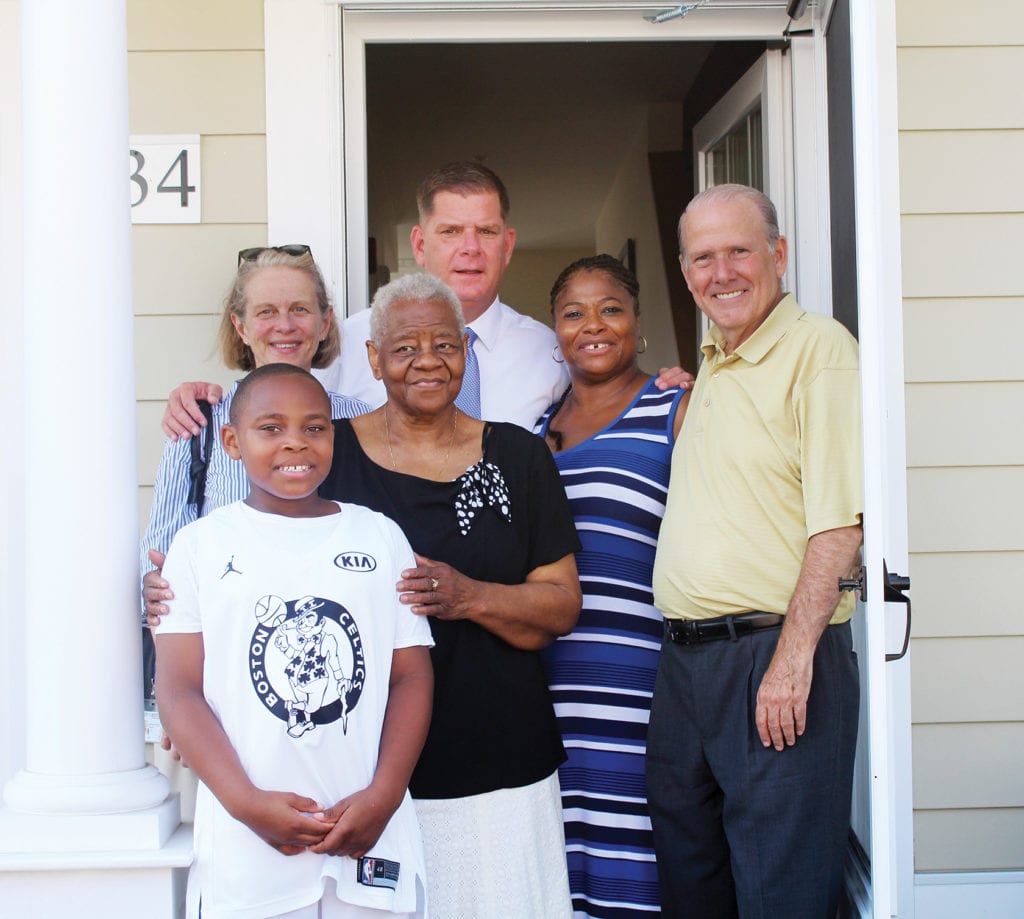Ex-Whittier St. resident buys first home
New homeowner supported by city agencies

Patricia Brown, a former resident of the Whittier Street Development, became a first-time homeowner in Mattapan last month, proving that city agencies can successfully help public housing residents purchase their own homes.
Brown hosted Mayor Martin Walsh for breakfast at her new home on Wednesday, along with Boston Housing Authority (BHA) Administrator Bill McGonagle and Shelia Dillon, the city’s chief of housing and director of the Department of Neighborhood Development (DND), as well officials from several organizations that supported her through the home buying process. The single mother of four was able to purchase the property in Olmsted Green thanks largely to financial support from a DND lottery, a $7,200 grant from the Whittier Choice Neighborhood Initiative, and guidance from Economic Mobility Pathways (EMPath) and the Boston Home Center.
“I’m just grateful for all of the support that I was given and I continue to get from all the different agencies, the City of Boston, EMPath, Boston Housing and Boston Home Center,” said Brown. “I’m still a little shocked, but I’m very thankful, grateful, blessed — and we’re happy.”
After a brief basketball dunk contest in Brown’s 9-year-old grandson’s bedroom, Walsh congratulated the new homeowner, who moved in with her grandson and her mother on Aug. 1, for achieving “the Boston dream” of owning her own home.
“It was just a good feeling, to walk in the front door and know it’s yours,” said Walsh, recalling how he felt when he bought his first home in Savin Hill. “That’s important, so I want to congratulate Patricia and her mom and her grandson.”
Brown and her family previously lived in Whittier Street public housing, which is currently undergoing a $30 million redevelopment, courtesy of a federal grant from the Choice Neighborhoods Initiative, awarded to the BHA and the DND. Demolition of the site, which began in February, is now complete and the foundations for the first new building, expected to open in fall 2019, are being laid. The first phase of the redevelopment will create 92 mixed-income apartments in three new buildings on site, and the second phase will add 76 mixed-income apartments in Madison Park Village. The entire project is scheduled for completion by 2021.

Patricia Brown’s grandson shows the mayor his new room at home in Olmsted Green, challenges him to a dunk contest. photo: Mayor’s Office Photo by John Wilcox
Brown was offered coaching by a dedicated mentor from EMPath, which is supporting all Whittier Street tenants during their relocation. She also received financial support from the Whittier Choice Neighborhood Initiative, which aims to give residents economic independence, McGonagle said.
The DND lottery funding Brown received was central to making the purchase financially possible. “You’re not rich, but you’re one of many now,” she said, describing how she felt when she realized she would receive the grant. Eligibility for the lottery is judged according to certain criteria that stipulate applicants must be first-time homebuyers, have assets that do not exceed $75,000 and meet income limits based on household size.
But, “it didn’t happen just by filling out a lottery slip,” said Walsh, emphasizing the responsibilities that lie with applicants and potential homeowners to ensure their credit ratings are healthy and their personal finances are in order.
He also spoke about the relationship building his administration is undertaking with banks. “It’s not just simply building housing, it’s creating access to that money, that capital, to be able to build a home,” said Walsh. He hopes this will make it easier for people of color to find lenders that will enable them to purchase their own home, something the mayor admitted has been difficult in the past.
Homeownership is important for Boston, said Dillon, because it creates stable neighborhoods and helps families increase their equity.
“As prices get less and less affordable in the city, we’re really trying to build affordable home ownership stock,” Dillon told the Banner. “We’re doing everything we can to encourage affordable home ownership in the city.”
The latest phase of Olmsted Green, developed on the former Boston State Hospital site, was completed this past July, and brings 514 mixed-income units to the area, 41 of which will be for sale at prices ranging from $210,000, for first-time buyers making at or below 80 percent of the Area Median Income (AMI), to about $350,000 for market-rate units.
“We created a neighborhood here,” said Walsh, who stressed the importance of building communities as well as physical homes. “This is not a house on a street that was an empty lot, this is actually a neighborhood.”
The sense of community in Olmsted Green can be credited to the development’s design, said Dillon, who noted that having houses face one another and communal outdoor spaces can have a significant social impact. “[This design] was really important because otherwise it could have felt like a bunch of single-family homes and there would be no connectivity,” she said.
Dillon also said it was important that DND and BHA initiatives support a diverse group of first-time buyers. “Were looking for integrated communities and spaces where people can gather and really feel like a part of something,” she told the Banner.
Settling into the neighborhood and becoming part of the community is what Brown is most looking forward to, and “being able to come home and not have to worry about the traffic that we had to live with,” she said.
While she’s met many of her new neighbors, who she described as friendly, she’s excited to attend her first neighborhood association meeting. “That’s going to be a big thrill,” she said.






